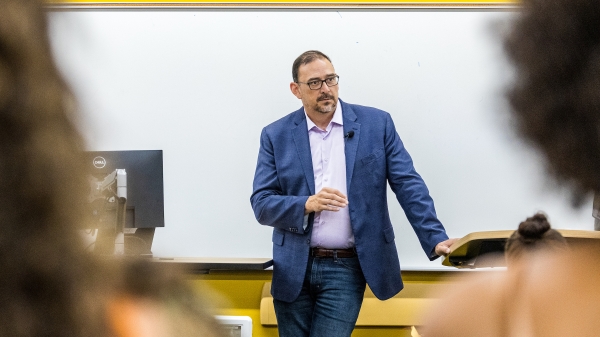ASU hosts 51st annual Peace Science Society (International) meeting

The final session of the annual meeting of the Peace Science Society (International), hosted by ASU, was devoted to two dozen posters primarily highlighting the work of graduate students on similar topics.
Arizona State University's School of Politics and Global Studies (SPGS) hosted the annual meeting of the Peace Science Society (International) on Nov. 2-4 at the Tempe Mission Palms. Cameron Thies, professor and director of SPGS, served as the local host for the event. This 51st meeting of the society included more than 250 scholars from the U.S. and around the world.
The society was founded in 1963 in order to promote the social scientific study of peace, conflict and conflict management in international relations. Since that time it has held workshops and conferences and developed a journal known as Conflict Management and Peace Science toward that end.
The 2017 meeting at ASU began on Nov. 2 with nine separate workshops held at the Memorial Union designed to foster collaboration in the creation of data sets and the publication of book-length projects and to tackle real-world problems of conflict management. Topics covered in these workshops included the role of UN peacekeepers, designing security institutions in developing countries, the development of text-as-data methods, the use of game theoretic models for civil conflict, mediation and cybersecurity among others. The workshops were attended by more than 100 participants engaged in these focused research projects.
The main conference started on Nov. 3 at the Tempe Mission Palms with a memorial session devoted to former SPGS faculty member Professor Will H. Moore. Moore had previously served as president of the Peace Science Society. Colleagues, former students, friends and family attended the event to remember his contributions to the field.
The remaining sessions on Nov. 3-4 were devoted to individual papers. The topics covered the usual wide range of issues connected to the social scientific study of peace and conflict, including work on insurgency, counter-insurgency, territorial conflicts, terrorism, nuclear proliferation, interstate war, coups, election-related violence and repression, as well as methodological advances in data collection and analysis. The final session was devoted to two dozen posters primarily highlighting the work of graduate students on similar topics.
SPGS faculty, including Reed Wood, Mark Ramirez and Henry Thomson, presented their research. Nine SPGS graduate students were featured in prominent roles helping to manage the conference.
For more information on the Peace Science Society (International), please see its webpage at http://sites.psu.edu/pssi/.
More Law, journalism and politics

New report documents Latinos’ critical roles in AI
According to a new report that traces the important role Latinos are playing in the growth of artificial intelligence technology…

ASU's Carnegie-Knight News21 project examines the state of American democracy
In the latest project of Carnegie-Knight News21, a national reporting initiative and fellowship headquartered at Arizona State…

Arizona secretary of state encourages students to vote
Arizona Secretary of State Adrian Fontes looked right and left, taking in the more than 100 students who gathered to hear him…